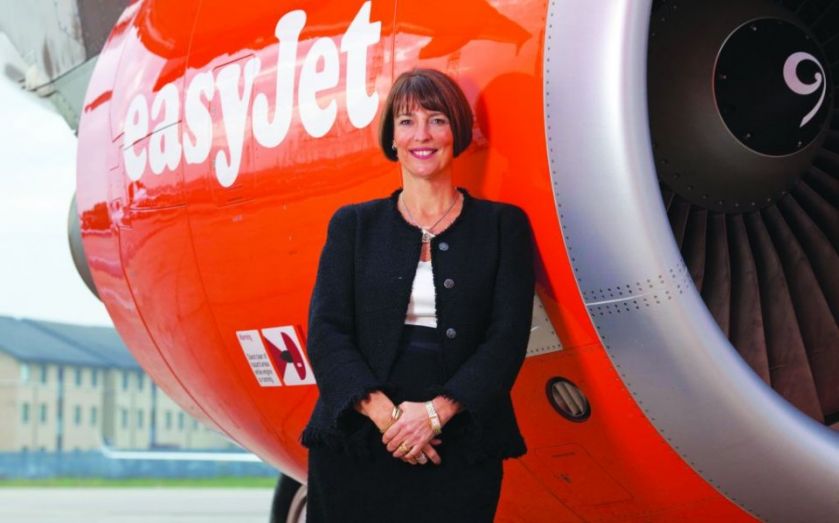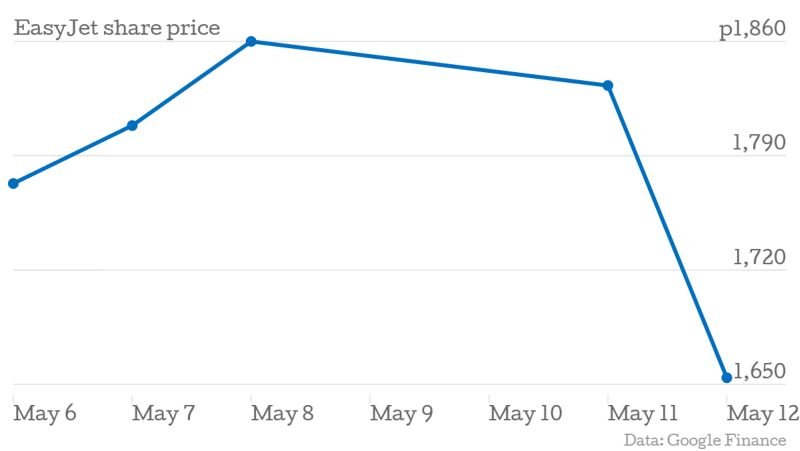EasyJet share price slumps despite rise in profits as airline seeks to fly over April

Shares in easyJet hit turbulence yesterday, despite the company announcing a pre-tax profit for the half year up to 31 March.
The low-cost carrier announced a pre-tax profit of £7m for the six-month period, but its share price slumped, closing down 9.77 per cent, due to profit fears caused by a difficult April.
“April was a really horrible month,” said chief executive and former City A.M. award winner, Carolyn McCall, referring to the French air traffic controllers’ strike.
Despite the warning for April, McCall remains positive for the second half of the year. “Consumers are going to have a good time this summer, but actually our costs are going down as well. Because of fuel being so low, we’re going to save between £90m and £120m in the year.”
“We are very, very pleased with first-half performance. Of course, lower fuel prices have helped us in the first half, but a lot of the things in the customer initiative have really paid off,” she said.
This includes introducing allocated tickets, which EasyJet consider to have been successful.
The firm’s Airbus A320 aircraft will be retrofitted from next year, with six extra seats being jammed into the cabins by summer 2018.

“Our revenue is growing year on year, but our revenue per seat is going down, and that’s good news for consumers, and that stimulates demand,” McCall added.
EasyJet is also seeing more suits in its seats, with 62 per cent of business passengers rebooking, compared with 58 per cent of leisure passengers. They are “good yielding passengers,” she said, referring to the likelihood of business passengers purchasing extras, such as speedy boarding, in order to aid efficient travelling.
The low fuel-cost environment has clearly helped the industry, but is there a risk that if the oil price goes up, EasyJet would be in trouble?
“From an EasyJet point of view, if fuel were to go up again, then irrational capacity in the market would actually come out, and so the legacy carriers that have been retrenching would have to take capacity out of the market, as they were doing a couple of years ago, as they can’t afford to fly unprofitably,” she said.
Yet it’s not only oil prices and frustrated French air traffic controllers that are affecting the industry. Aviation is putting itself in the brace position for two major pieces of political intervention coming down the runway – an upcoming EU referendum and the Lord Davies report into airport expansion in London.
McCall made it clear yesterday that easyJet would be lobbying strongly for Britain remaining in a renegotiated EU. “We are just saying that we believe being in Europe is better for Britain than being out of it, it’s certainly better for aviation,” McCall said.
“There are a whole ream of British businesses who hold the same position,” she added, “and we will certainly be joining with them in making that case.”
Despite her firm not currently flying out of Heathrow, and saying that Gatwick is “very, very good,” McCall is clear that the west London hub needs to be expanded.
“Nobody is screaming for more capacity at Gatwick, everyone is screaming for capacity at Heathrow,” she asserted.
We might also see the famous orange-liveried planes flying out of Heathrow, however, if Lord Davies gives it the go-ahead. McCall said that the firm “would fly out of Heathrow” were it to be expanded.
April may have caused a bump, but EasyJet is hoping to see profit really take off during the summer.